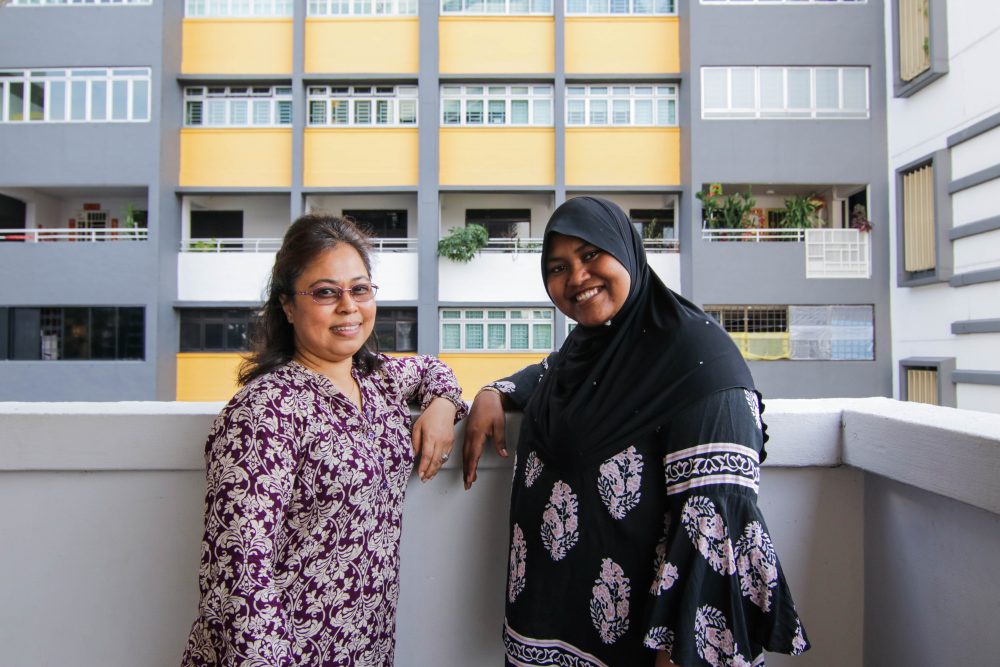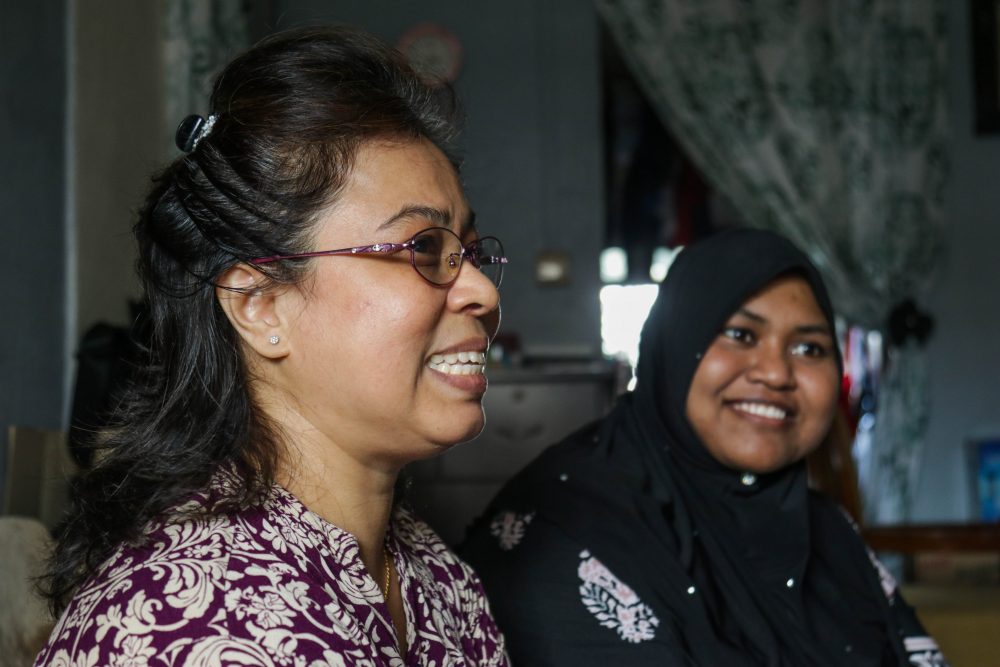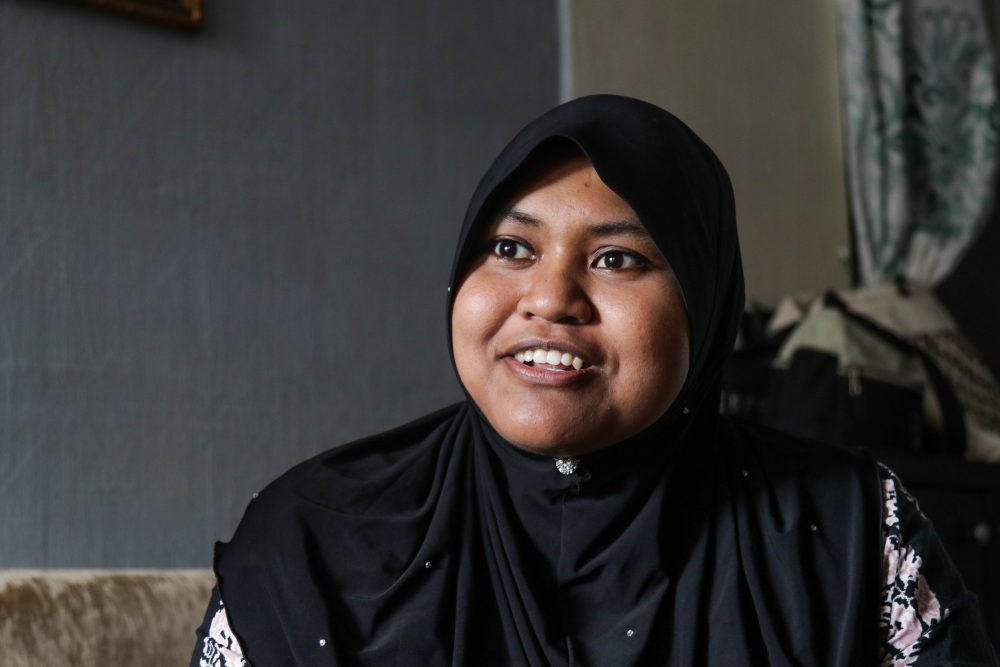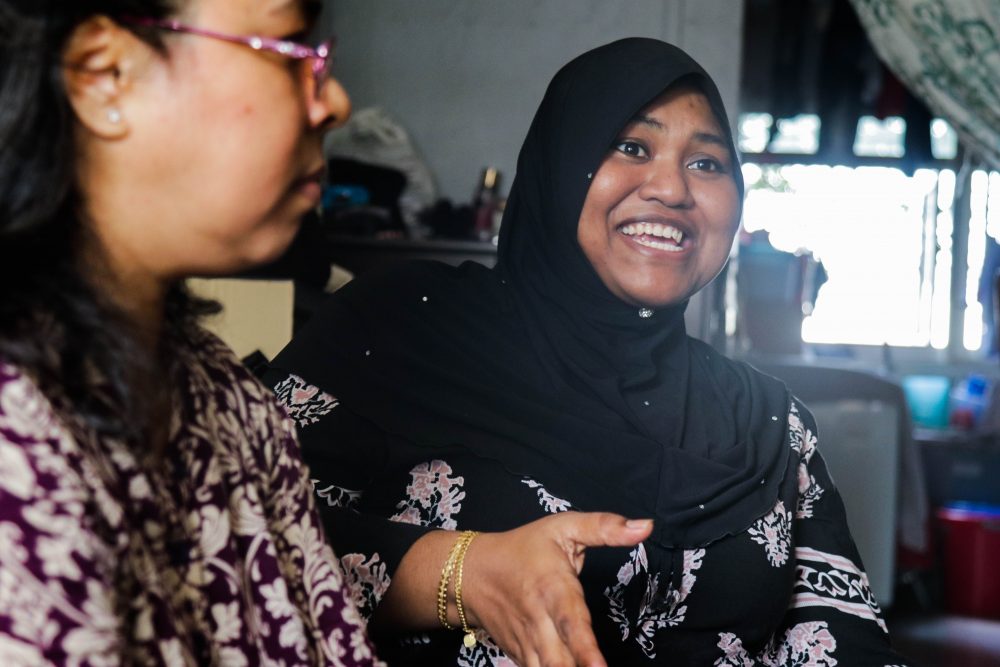As we step into Diljan Shaik Arif Ali's Ang Mo Kio rental flat, she welcomes us with a heaping plate of kueh and too many packet drinks.
Meanwhile, her neighbour Fadillah Abdullah mouths a hello while speaking to someone on the phone.
The two of them just returned from the market, says Diljan, and one of their neighbours was calling to update them on her trip to the hospital.
"She has been complaining about a toothache for the last week," Fadillah explains later. "Suddenly she decided to pull it out at a clinic yesterday. I think she had an allergic reaction to the jab at the clinic so last night she called and asked us to take care of her kids while she is at the hospital."
 Fadillah (left) and Diljan (right). Photo by Rachel Ng.
Fadillah (left) and Diljan (right). Photo by Rachel Ng.
For someone whose interaction with his neighbours is restricted to hellos along the corridor, this neighbourly affection is strange and exists only in fictional drama settings. For a fleeting moment, the image of Dolly and Rosnah (from TV sitcom "Under One Roof") pops into my head.
Opening my house to my neighbours? Taking care of their kids? What?
But we are getting ahead of ourselves.
I first met Diljan and Fadillah a couple of weeks back at an event held by Beyond Social Services.
There, the volunteer group released the results of a longitudinal study showing that youths living in rental flats feel more empowered when they are engaged with their community.
Beyond Social Services believes in nurturing ground-up community initiatives that keep low-income youths engaged.
Diljan and Fadillah's children are beneficiaries of Beyond Social Services. At the briefing, Fadillah nearly teared as she shared about her experience when she first moved into her Ang Mo Kio rental flat 11 years ago.
It was a moment that stuck with me and in turn led to this moment in Diljan's living room, learning how the two women first started their rental-flat lives together.
"Is this how people in rental blocks live??"
After her marriage failed in 2007, Fadillah had to sell her matrimonial flat and uproot her three children into a rental flat. It was a world totally different from what she was used to.
"I saw a lot of things that I never saw before," the 46-year-old says. "I remember asking myself is this how people in rental blocks live??"
 Fadillah described rental flats as a totally different world. Photo by Rachel Ng.
Fadillah described rental flats as a totally different world. Photo by Rachel Ng.
What shocked her, she says, was the prevalence of drug and substance abuse, especially among the younger residents.
You can imagine how unnerving it was for the then mother-of-three to find needles and bags of glue in her neighbourhood stairwells.
"At first I disapproved of my kids making friends in this area," Fadillah says, with a weary smile.
Her disapproval fell on deaf ears, though — Fadillah's children still went ahead to hang out with their neighbours. Despite acknowledging that she cannot control her kids too tightly, the situation nonetheless was a constant source of worry for her.
"I was scared. I was afraid that if the children get into contact with such stuff, bad things would happen."
While her eldest daughter has since moved out, Fadillah lives with her current husband and other three children in her Ang Mo Kio rental flat on a household income of S$3,500 — which is pretty respectable if you think about it, but still tough for a family of five.
39-year-old Diljan, on the other hand, moved into her rental flat 18 years ago after getting married. Due to a medical condition of hers, she could not find a full-time job. In view of that, she focused her energies on being a housewife.
Today, Diljan and her family of four get by on a household income of S$2,000. She continues to be a stay-home mother, and devotes a large portion of her time to her community.
"I just wanted to make myself busy, so I joined a lot of volunteering activities, first as a grassroots member with the Residents' Committee and then with Beyond Social Services," she tells us.
"When we went door-knocking to meet the residents, I found out that a lot of people actually need help, the senior citizens and big families with a lot of children, especially young children loitering around."
Fadillah tells me that these children are usually left alone after their parents are imprisoned for various crimes. In some cases, they may have grandparents who can look after them, but more often than not, the kids are left to their own devices.
So in 2008, Diljan decided to set up a tuition programme at the Yio Chu Kang Resident's Committee centre for the latchkey children after hearing from families she spoke to that they cannot afford to send their kids for tuition.
 The tuition programme set up by Diljan brought together students from elite schools and neighbourhood kids. Photo by Rachel Ng.
The tuition programme set up by Diljan brought together students from elite schools and neighbourhood kids. Photo by Rachel Ng.
"We just ran the programme every Tuesday from 7pm to 8:30pm and Friday from 7pm to 9pm. At first we got students to come in and help the children and assist them with their homework."
The RC managed to get students from Raffles Institution, Hwa Chong, and CHIJ to come down and tutor the kids. It was a win-win for all. The students fulfilled their Community Involvement Programme (CIP) requirements and it also met a real community need.
As an added bonus, the tuition programme also kept the kids preoccupied with something worthwhile, says Diljan with a warm smile.
"At the same time, the students interacted with the children. They even call them "zeh zeh" (big sister) and "kor kor" (big brother). The bonding is there."
One year later, Beyond Social Services came in to provide help to both Diljan and Fadillah's families, and that was where the two ladies met. Diljan's tuition programme also received more children, whom Fadillah brought from her rental block.
Self-proclaimed "kaypoh makciks"
And that's how they bonded too — through a shared concern for their neighbours.
One may initially dismiss the two women as kaypoh makciks (overly inquisitive aunties) with too much time on their hands — a label the ladies are quick to acknowledge and embrace as an identity as well.
But it's one thing to be inquisitive for the sake of gossiping, and a whole other to effect real change.
Says Fadillah:
"I know lah, people will say we are gossiping, but we share between the two of us, and we always try to work out something."
Both ladies acknowledge that their initial presence in the neighbourhood sparked some suspicion from the grown-ups. I mean, I can't really blame them — the optics of a stranger chatting up little children outside your home aren't so ideal.
Fadillah shares that parents initially doubted her intentions but over time warmed up to her when they observed noticeable changes in the neighbourhood's youngsters.
One example she shared with me was a little girl who frequented Fadillah's place to play with her youngest daughter.
She had noticed that the girl had not been going to school for about two semesters. After inquiring, she found out that the girl's parents were not around and her grandmother was facing financial problems. Fadillah helped to link the grandmother up with a family service centre and also sent the girl back to school.
"I feel happy when she goes back to school. Even if she's not doing well, it's ok as long as she has something to do and she looks forward to going to school."
Diljan adds that parents also benefit when their children are doing well.
"The parents are also happy when their children are happy. They feel like they can trust us. In the beginning, the adults thought we are kaypoh but now they come to us telling us about their problems as well."
Diljan shares how recently her neighbours alerted her to an Indonesian neighbour who was suffering from post-natal depression and contemplating. She was also facing problems adjusting to life here.
Diljan said she went to see her and encouraged her to drop by her house just to talk and eat — a simple gesture, yet so effective in getting her neighbour to unload her burdens.
Reaching out with food and hospitality
Speaking of eating, cooking is one of Diljan's main tools in her volunteer work.
Her rental block regularly receives food from SG Food Rescue and Free Food For All, volunteer groups which redistribute excess food to communities in need.
After most of the food is distributed, Diljan takes what is left and cooks it into delicious dishes that she brings to elderly folks living in a nearby rental block.
"These senior citizens are alone, they got no one to talk to. They tell me that they love home-cooked food but rarely cook because they live alone. So I take these vegetables, I cook, and I send it to them."
 Diljan regularly delivers home-cooked food to lonely senior citizens in her neighbourhood. Photo by Rachel Ng.
Diljan regularly delivers home-cooked food to lonely senior citizens in her neighbourhood. Photo by Rachel Ng.
Fadillah, on the other hand, works part-time, but still finds the time to offer her neighbours hospitality.
Sharing about a recent case of domestic abuse that happened in her neighbourhood, she tells us that she went to visit the victim in the hospital. When she found out that the lady had no one to take care of her post-discharge, Fadillah decided to offer her a place in her home.
She recalls quietly:
"She was in really bad shape, and beaten up. She had a broken jaw and one of her eyes was punched.
The lady was so thankful that she kept saying thank you kakak (elder sister), thank you kakak. It showed her that the community cares for her."
But for both Fadillah and Diljan, this is what a community is about and it spurs them to continue doing what they do.
"It's not that we are proud of ourselves, but we're glad that the community knows that we are here, they also have someone who will listen to them. We tell them that you have to be strong. Everybody got problems but we experience in different ways."
Community spirit
Today, Fadillah and Diljan are known as "Umi" (from the Arabic word for mother) and "Mummy-Jan" in the neighbourhood.
In fact, when they're walking around the neighbourhood, it's not uncommon for their neighbours to call out to them and stop them for a chat. Fadillah's husband once joked that she's the community's de facto Member of Parliament.
The two ladies also maintain the contacts of all the residents in their blocks so that they can mobilise neighbours for ground-up initiatives. These can range from reading and tuition for kids to yoga and zumba classes for adults.
Because of the efforts the ladies put into the community, their neighbours are also starting to find value in giving back and maintaining the gotong royong (communal) spirit people are often heard reminiscing from the old kampong days.
After almost a decade of investing into their community, the ladies tell me that they are seeing a difference. The discarded drug needles in stairwells and stories of bicycle theft are now replaced by lively, friendly neighbourhood chatter.
"This is the first time I feel that the community is my family. It's my big family," Fadillah says.
 Today, Fadillah and Diljan are well-known around their neighbourhood. Image by Rachel Ng.
Today, Fadillah and Diljan are well-known around their neighbourhood. Image by Rachel Ng.
Could something like this be replicated in another neighbourhood, one which is more affluent perhaps? Fadillah pauses before saying no.
"I don't think so... Maybe there aren't people like us in those neighbourhoods. Maybe their kids are not in desperate need."
She shares that she has stayed in non-rental estates and helped out with RC activities in other places but has never seen this level of community involvement elsewhere.
The irony is not lost on me. For a neighbourhood most would objectively conclude to be lacking in material wealth, it is rich in community spirit.
In the current debate about social inequality, it's so easy to relegate low-income folks to the lowest social class bin, and push government policies and initiatives to help lift them out of their poverty cycle.
But certainly, I do think we can learn plenty from them — in particular, all the things we lost in our relentless quest for more wealth, development and economic growth.
Like what it means to really live together as a community.
Top photo by Rachel Ng.
[Update: A previous version of this article misspelled Fadillah's name. We have rectified the error]
If you like what you read, follow us on Facebook, Instagram, Twitter and Telegram to get the latest updates.

